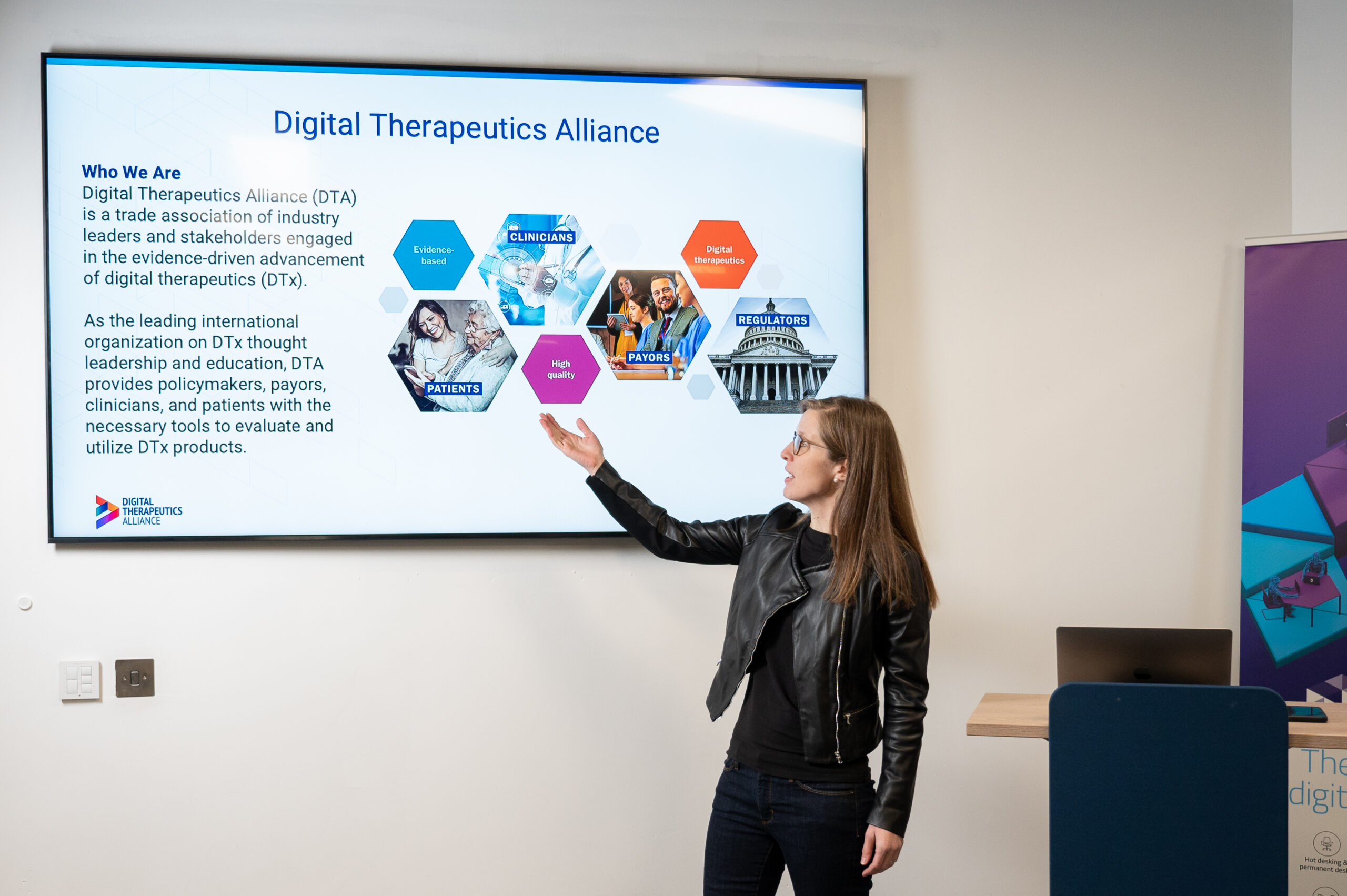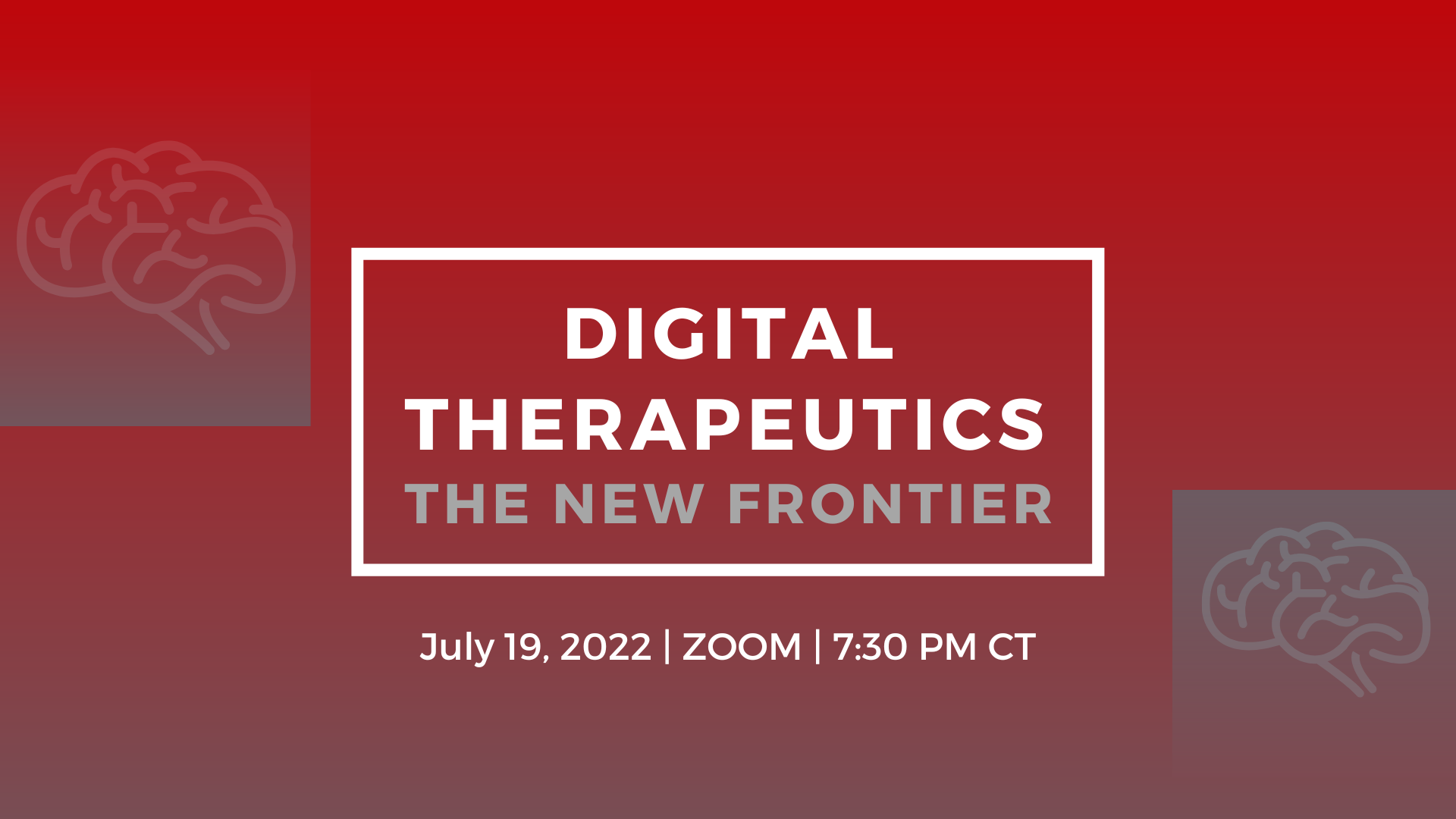Megan Coder (PharmD ’09) helped found the international Digital Therapeutics Alliance to weave digital therapeutics into healthcare
By Katie Ginder-Vogel
After a long day, it might feel therapeutic to spend some time scrolling through your cellphone. But with the advent of new technologies, your cellphone might soon be pivotal to clinically validated therapeutics.
Megan Coder (PharmD ’09) keeps this vision in mind as she helps to lead an international non-profit association that’s focused on advancing digital therapeutics companies: the Digital Therapeutics Alliance (DTA). As a co-founder and chief policy officer, Coder is working to develop global standards for digital therapeutics, like those that exist for pharmaceuticals, backed by studies, evaluation, and ingredient information.

Coder — who grew up in Brookfield, Wis. — describes her path as “nontraditional,” and says it all began when she was a pharmacy technician at Community Memorial Hospital in Menomonee Falls, where she loved being part of the health system. Fascinated by the field, she applied to the University of Wisconsin–Madison School of Pharmacy.
“At the School, I experienced a new universe filled with more wonder and joy than I expected, and I took every opportunity to explore and forge new paths,” she says.
In pharmacy school, Coder could sense the immense potential for previously unimaginable therapies for patients but says she couldn’t have anticipated the ways in which digital therapeutics would change the game.
“When I was in pharmacy school, the idea of using software and clinically validated apps to treat disease was science fiction,” says Coder, now based in Great Britain. “I knew there would be aspects of disease that couldn’t be treated by drugs alone, but I didn’t imagine this category of medicine that I would one day be involved with.”
Always a trailblazer
Even as a student pharmacist, Coder established herself as an innovator. She explored new opportunities when they were available — and built new pathways when they weren’t.
Coder co-founded the Pharmacy Global Health Interest Group, an international health student alliance, with two other UW–Madison students from other professional schools. She served as president of the Wisconsin Society of Pharmacy Students (WSPS) and was in the first cohort to receive a Certificate of Global Health from UW–Madison. Focused on population health and global health issues, Coder created a summer internship for herself through a center for the World Health Organization (WHO) in Geneva, Switzerland. Later, in her fourth year, she did a clinical rotation with the U.S. Food and Drug Administration and created another internship for herself at Supply Chain Management System, a Washington, D.C.-based organization that provides health products for people living with HIV and AIDS.
Faculty at the School gave her the support and flexibility she needed to pursue her interests and build her own opportunities, she says.

“It was a really cool environment, where didactic work mattered, and they let me do so much more. I kept exploring and asking, ‘What about this?’ and I was given the support to do it,” Coder says. “It’s fun to remember how it all came together, and it was fun to create new things I hadn’t seen done before.”
Coder says the amount of support she received from faculty gave her lasting confidence, and she says she’s grateful for the positive reception she received for her ideas.
“You’re only a student once, and there’s no other point in time where organizations will say, come on in, we’ll teach you,” she says. “Confidence, support, and my foundation from pharmacy school enabled me to take these leaps of faith as a student and young professional.”
After earning her PharmD, Coder completed an executive residency in Association Management and Leadership with the American Pharmacists Association (APhA) Foundation in Washington, D.C. During her residency, Coder learned about the financial, policy, advocacy, legislative, governance, and marketing facets of running a national association.
“My APhA residency was life-changing,” she says. “I’d lived in Wisconsin my whole life, so moving to D.C. felt so cool. I was in the same field as my degree but doing such different work.”
Coder’s first job after her residency was with the Pharmacy Technician Certification Board, where she learned how to convene stakeholder groups and policymakers with different perspectives and to focus on finding common goals. Once common ground was established, it was possible to create solutions that worked for everyone.
Coder’s next move landed her in the field she’s still helping to lead today: digital therapeutics.
A global impact on digital therapeutics
Digital therapeutics, or DTx, is a category of software programs that treat, manage, or prevent a disease or disorder, which can be used independently or in combination with medications, devices, or other therapies. One local example is Madison-founded Propeller Health, which distributes asthma medication via a special inhaler that is equipped with sensors that pair to a smartphone app to automatically track medication use. The founder of Propeller Health, David Van Sickle, would eventually end up working alongside Coder to launch DTA.

Coder spent a year as a project manager at DTx company Iodine, which merged with GoodRx in 2017, writing “de-jargonized” medication descriptions that patients could more easily understand. Then she returned to Washington, D.C., to work for the Pharmaceutical Care Management Association (PCMA), where she experienced a new business side of the industry and learned more about the complexity of the healthcare system and relationships.
“After all those experiences, and with my strong foundation from pharmacy school, I started to understand the opportunities in different parts of the healthcare world,” she says. “I followed my husband to Paris for his job, where PCMA connected me to Voluntis.”
Voluntis CEO Pierre Leurent had come up with the idea of the Digital Therapeutics Alliance (DTA) in January 2017, along with three other leaders in the field: Van Sickle; Eddie Martucci, founder and CEO of Akili Interactive; and Anand Iyer, chief analytics officer of Welldoc. The aim of DTA was to ensure legitimacy and integrity in the digital therapeutics industry. Martucci and Iyer still sit on the Board of Directors.
“Those companies were in the market, serving patients, but the industry hadn’t yet coalesced around an idea of what DTx products were,” says Coder. When Coder began working at Voluntis that May and learned about the project, she asked to be assigned to it. She initially served as the senior manager of public affairs, and within five months Coder helped launch DTA as the standalone global nonprofit organization it is today.
“Within a few weeks of working with Voluntis, I realized that for it to meet its potential to impact full-scale organizational care, we needed to scale it,” says Coder. “We started DTA to help end users — payers, patients, clinicians, and policymakers — understand how to evaluate, engage with, and optimize DTx products in patient care.”
“That’s the goal — to make different modalities of care available to pharmacists. We haven’t been able to treat some disease symptoms, and now we can.“
—Megan Coder
DTA members attest to a set of core principles that demonstrate their dedication to high-quality digital therapies for patients, and the organization educates professional groups and government agencies about digital therapeutics, encouraging participation. DTA is working with Medicare and Congress to obtain recognition for a digital therapeutics benefits category, as a modality to deliver therapy to patients.
The organization has grown and hired staff for patient and clinician engagement, as well as a CEO. Coder is now chief policy officer, which she says is a good fit for her focus on standards.
“I love it; it aligns with my mission in life,” Coder says. “For these therapies to reach patients at scale, our goal is to set global and local standards for DTx product quality and access.”
Building the future
Coder says her work with digital therapeutics unifies the different aspects of her career. She aims to enact meaningful change related to the delivery, quality, and safety of healthcare globally.

“Whether I meet that goal through pharmacy, health system development, or now digital therapeutics, I want to align with that goal in everything I do,” she says. “DTx didn’t exist before, so the fun part is, now, we’re creating a new category of medicine. How do we weave that into the fabric of healthcare?”
Coder envisions a complete integration of digital therapeutics into healthcare, with clinicians able to order, prescribe, and dispense digital therapeutics the same way they do for regular medications.
“That’s the goal — to make different modalities of care available to pharmacists,” says Coder. “We haven’t been able to treat some disease symptoms, and now we can. That, I think, is incredible. In-person therapy can be paired with pharmaceutical therapy and digital therapy. It equips providers and clinicians with more tools to use, and patients have so many more ways to engage with their healthcare.”
Embracing a more digital and dynamic future of healthcare, Coder advises current students to be agile and knock on every door, learn as much as they can, and not be afraid of pivots, because they can result in incredible opportunities.
“Try to put things in perspective about what success looks like,” she says. “Even failures still move you forward. I could not have imagined being where I am today when I graduated. I’ve hit roadblocks and failed attempts, but not every failure or rejection is a bad thing. They directed me to where I am today.”
